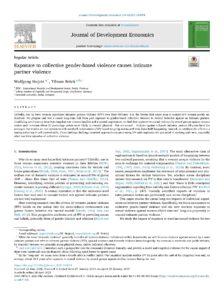Globally, one in three women experience intimate partner violence (IPV) over their lifetimes. Yet, the factors that cause men to commit IPV remain poorly understood. We propose and test a causal long-term link from past exposure to gender-based collective violence to violent behavior against an intimate partner. Combining novel survey data from Angolan war veteran families and a natural experiment, we find that exposure to sexual violence by armed groups against women makes male veterans about 30 percentage points more likely to commit physical – but not sexual – violence against a female intimate partner 18 years later (on average). Our results are not consistent with standard explanations of IPV based on group norms and intra-household bargaining. Instead, we attribute the effect to a lasting reduction in self-control skills. These findings challenge standard approaches to preventing IPV and emphasize the potential of working with men, especially after episodes of collective violence.
Publication Details
- Year of Publication: 2023
- Region/s: Sub-Saharan Africa
- Theme/s: Humanitarian Emergencies · Individual Decision-making · Micro-Data Collection · Violence & Peacebuilding
- Research Topic/s: Conflict Measurement · Disasters & Emergencies · Gender · Violence & Conflict
- DOI: https://doi.org/10.1016/j.jdeveco.2023.103054





